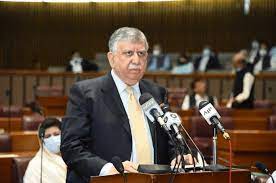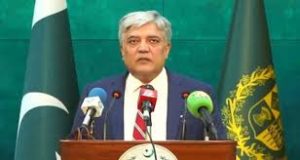Govt unveils Rs 8.4 trillion budget for FY2021-22

Islamabad): The Pakistan Tehreek-i-Insaf (PTI) led government Friday unveiled Rs 8.4 trillion federal budget for the fiscal year 2021-22.
Presenting the budgetary proposals in the National Assembly, Minister for Finance and Revenue Shaukat Tarin said the government steered the economy out of crisis and put it on the growth trajectory by pursuing prudent policies under the leadership of Prime Minister Imran Khan.
He said the country was now out of a dangerous situation as the government took initiatives for its economic sustainability as evident from 3.94 percent Gross Domestic Product (GDP) growth rate during the current fiscal year.
The minister said it was for the first time that any government had to face a critical situation and it successfully put the economy on a sustainable growth path.
He said the Current Account was now $800 million in surplus, as compared to a deficit of $20 billion at the end of last government.
He said the previous governments had also manipulated the exchange rate, which had adversely affected the economy, resulting in the depletion of foreign reserves to $10 billion.
However, they increased the reserves by taking loans, which were now being repaid by the incumbent government, he added.
Tarin said the government had successfully fulfilled all the international commitments, besides putting the economy on a growth trajectory. For the purpose, it had to take tough decisions, such as reducing public expenditures and enhancing revenues, he added.
He said during the current year, the agriculture sector did perform well despite locusts attacks and all the major crops, except cotton, witnessed positive growth.
Likewise, the services and the large-scale manufacturing sectors also had considerable growth despite the COVID-19 factor, he added.
The minister said one of the top priorities of the incumbent government was to uplift the downtrodden segments, and for the purpose, 40% of the total population was given cash transfers, besides providing relief to 15 million households across the country.
The finance minister said the government would focus on inclusive growth of the economy next year and it had set a target of 4.8 percent.
He said the downtrodden segments would be fully taken care of as the government would adopt a ‘bottom-up approach to help up to six million households and saving them from ‘trickle-down effect’.
He said urban households would be provided up to Rs 0.5 million interest-free loan each for businesses, while farmer households would be given Rs 150,000 interest-free loan for each crop, in addition to Rs 200,000 interest-free loan on for buying tractors and agriculture implements.
Moreover, up to Rs 2 million loans each would be provided for low-cost housing while every household would be provided health card, with one person of such unit imparted technical training, he added.
Tarin said the government would have to ensure 6 to 7 percent growth to accommodate the youth, as 65 percent of the population was below 30.
He said the government was evolving a comprehensive strategy, under which the farmers would be provided seeds, fertilizers, loans, tractors and machinery, besides setting up cold storages and commodity warehousing to help increase their income.
The minister said the country’s imports had gone down to 8 percent of the GDP, which were around 12 percent 15 years back. Efforts were afoot to enhance the exports for which special economic zones were being established for value addition, he added.
He said the housing and construction sector was also on priority as around 10 million houses were required. Due to the government’s focus, the sector had already witnessed increased activity.
The minister said for bringing improvement in the energy sector, the government had devised a comprehensive strategy, including the circular debt management plan and restructuring with the private power producers, incentives provided to the industry for increased use of excess electricity and necessary investment in power transmission and distribution to reduce system losses, the announcement of electric vehicle policy, and induction of cheap power through hydro renewable energy to reduce overall cost.
In addition, he said, the government was working on finalizing short, medium and long-term plans in different sectors, including finance and banking, budget and debt sustainability, price stability, industry and exports, public sector enterprises and privatization policy, information technology, and domestic commerce.
The minister said the development budget was enhanced from Rs 630 to Rs 900 billion, which was an increase of around 40%. Its focus would be on developing food and water security, energy sector, improving the critical road infrastructure, advancing implementation of CPEC, establishment of operations in Special Economic Zones, sustainable development goals, combating climate change, technology-driven knowledge economy, and removing regional disparities.
He said the government had announced the National Agriculture Emergency Programme to uplift agriculture and livestock sectors on modern lines covering crops, livestock, fisheries and water sector.
He said during the next fiscal year, Rs 1 billion would be spent on the Locust Emergency and Food Security project, Rs 2 billion for enhancing productivity of rice, wheat, cotton, sugarcane and pulses, Rs 1 billion for enhancing olive cultivation on a commercial scale, and Rs 3 billion for improvement of water-courses.
The minister said for ensuring water security, the government was building water reservoirs, including small, medium and large dams, so that future water needs were safeguarded.
He said the three larger dams – Dasu, Diamer Bhasha, and Mohmand dams – were the priority in the budget. Some Rs 91 billion had been proposed in the budget for ensuring water security, including Rs 57 billion for Dasu hydropower project, Rs 23 billion for Diamer Bhasha Dam, Rs 6 billion for Mohmand Dam, and Rs 14 billion for Neelum-Jhelum hydropower project.
The minister said the government was committed to fast tracking implementation of CPEC as to date 17 projects worth $13 billion had been completed and another 21 of $21 billion were underway, while additional 26 strategic projects of $28 billion were in pipeline.
He said in the budget 2021-22, the key priorities were completion of Karachi-Lahore Motorway, near-completion of 120 km Phase-1 of Havelian Thakot and advancement work on 118 km Phase-II f Karakorum Highway, advancement of work on 118 km Phase-II of Karakorum Highway, advancement of work on Zhoa Kuchlak Road, and other projects.
The finance minister said in order to increase exports for moving out of recurrent balance of payment crisis and repeatedly opting for the International Monetary Fund (IMF) programmes, the government was investing in the establishment of special economic zones, supporting new exports in IT (information sector) sector and agro-based industries, and endeavouring make CPEC the platform where industries would be relocated, employment opportunities created and exports were made possible.
He said efforts would be made to promote foreign direct investment in the export sector. The government, he said, was also involving the private sector in the development projects. Currently, the Public Private Partnership Authority had 50 infrastructure projects of around Rs 2,000 billion at various stages of processing.
Six projects of Rs 710 billion would be processed in the next fiscal year, he added. The minister also mentioned the flagship Billion Tree Tsunami project for which the government had earmarked Rs 14 billion in the next budget.
The minister said the social sector development was also the priority of the government. Health, education, attaining sustainable development goals and climate change were some key areas of focus for which an amount of Rs 118 billion was proposed in the PSDP.
Talking about the budget’s salient features, the minister said the gross revenues for the next year had been estimated at Rs 7,909 billion against revised estimates of Rs 6,395 billion for 2020-21, showing growth of 24 percent.
He said the revenues of Federal Board of Revenue (FBR) were projected to grow by 24 percent from Rs 4,691 billion to Rs 5,829 billion. The non-tax revenues were expected to grow by 22 percent.
The minister said the provincial share in federal taxes would increase from Rs 2,704 billion last year to Rs 3,411 billion. It meant that additional Rs 707 billion or 25 percent as compared to the revised estimates, would be made available to the provinces, he added.
Tarin said after provincial transfers, net federal revenues were estimated at Rs 4,497 billion as compared to Rs 3,691 billion under the revised estimates for the last year, showing growth of 22 percent.
He said the federal expenditures were budgeted at Rs 8,487 billion for next year as compared to the revised ones of Rs 7,341 billion for 2020-21, showing an increase of 15 percent.
Shaukat Tarin said the current expenditure was projected at Rs 7,523 billion for next year against Rs 6,561 billion for last year, reflecting an increase of 14 percent.
Excluding interest and non-off expenditure on Covid-19 and settlement of IPP (Independent Power Producers) dues, the current expenditure was projected to increase by 12 percent, he added.
The subsidies, he said, were projected at Rs 682 billion for next year against revised estimates of Rs 430 billion last year, mostly comprising payments of dues of IPPs, tariff differential subsidies and subsidies on food.
He said the allocation for Ehsaas programme including that of Pakistan Baitul Maal and Poverty Alleviation Fund had been increased from a revised estimate of FY2020-21 of Rs 210 billion to Rs 260 billion, with an increase of 24 percent.
It was far the highest amount allocated for the lower-income segments of the society, he added.
The minister said the overall fiscal deficit budget was estimated at 6.3 % as opposed to the revised estimate of 7.1% for the current year, while the primary deficit was targeted at 0.7% as against the revised estimate of 1.2% for the year 2020-21.
Despite Covid-19, the government had continued its journey of reducing the primary deficit, he added.
Talking about the key-expenditure priorities in the budget 2021-22, the minister said it would focus on vaccinations, for which around $1.9 billion would be spent to protect the population from the COVID-19.
In addition, universal health coverage would be rolled out in collaboration with the provinces while SME support programmes would be introduced for risk sharing and collateral-free lending to SMEs for which various schemes had been envisaged for which an allocation of Rs12 billion was made.
Likewise, he said, Rs10 billion allocation was made for Kamyab Pakistan Programme whereas an anti-rape fund was being established with an initial allocation of Rs100 million.
An amount of Rs 66 billion had been proposed to be provided to HEC for the current budget and Rs44 billion for the development budget, which would be subsequently expended by an additional Rs15 billion, he added.
The minister said the government also announced various schemes for export sectors and public entities.
He said the Federal Government has increased allocations for Azad Jammu and Kashmir from Rs 54 billion to Rs 60 billion, for Gilgit Baltistan from Rs 32 billion to Rs 47 billion and for merged districts of Khyber Pakhtunkhwa from Rs 56 billion to Rs 60 billion.
Moreover, Shaukat Tarin said, a special grant of Rs19 billion had been provided to Sindh and Rs 10 billion to Balochistan over and above their National Finance Commission (NFC) share.
He said Rs 5 billion was proposed as federal share for undertaking new population census in 2022, and Rs 5 billion for the local government elections.
The minister said the government also proposed Rs100 billion for meeting exigencies related to Covid-19 pandemic.





